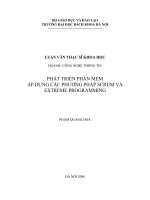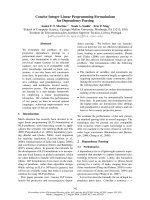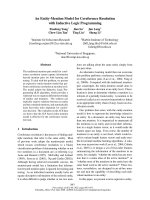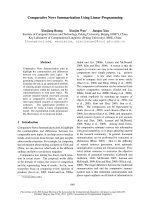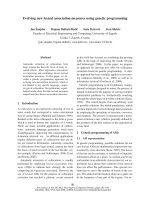Multithreaded programming
Bạn đang xem bản rút gọn của tài liệu. Xem và tải ngay bản đầy đủ của tài liệu tại đây (270.96 KB, 38 trang )
6.087 Lecture 13 – January 28, 2010
Review
Multithreaded Programming
Race Conditions
Semaphores
Thread Safety, Deadlock, and Starvation
Sockets and Asynchronous I/O
Sockets
Asynchronous I/O
1
Review: Multithreaded programming
•
Thread: abstraction of parallel processing with shared
memory
•
Program organized to execute multiple threads in parallel
•
Threads spawned by main thread, communicate via
shared resources and joining
•
pthread library implements multithreading
i n t pth r e a d_c r e a te ( pt h r e a d _ t th re ad , const p t hr e a d _ a tt r _ t a t t r , ∗ ∗
•
void ∗(∗ s t a r t _ r o u t i n e ) ( void ∗) , void ∗ arg ) ;
•
void pthread_exit(void ∗value_ptr);
•
int pthread_join(pthread_t thread, void ∗∗value_ptr);
•
pthread_t pthread_self(void);
1
Review: Resource sharing
Access to shared resources need to be controlled to
•
ensure deterministic operation
•
Synchronization objects: mutexes, semaphores, read/write
locks, barriers
•
Mutex: simple single lock/unlock mechanism
•
int pthread_mutex_init(pthread_mutex_t ∗mutex, const pthread_mutexattr_t ∗ attr);
•
int pthread_mutex_destroy(pthread_mutex_t ∗mutex);
•
int pthread_mutex_lock(pthread_mutex_t ∗mutex);
•
int pthread_mutex_trylock(pthread_mutex_t ∗mutex);
•
int pthread_mutex_unlock(pthread_mutex_t ∗mutex);
2
Review: Condition variables
•
Lock/unlock (with mutex) based on run-time condition
variable
Allows thread to wait for condition to be true
•
•
Other thread signals waiting thread(s), unblocking them
•
int pthread_cond_init(pthread_cond_t ∗cond, const pthread_condattr_t ∗attr);
•
int pthread_cond_destroy(pthread_cond_t ∗cond);
•
int pthread_cond_wait(pthread_cond_t ∗cond, pthread_mutex_t ∗mutex);
•
int pthread_cond_broadcast(pthread_cond_t ∗cond);
•
int pthread_cond_signal(pthread_cond_t ∗cond);
3
6.087 Lecture 13 – January 28, 2010
Review
Multithreaded Programming
Race Conditions
Semaphores
Thread Safety, Deadlock, and Starvation
Sockets and Asynchronous I/O
Sockets
Asynchronous I/O
4
Multithreaded programming
•
OS implements scheduler – determines which threads
execute when
•
Scheduling may execute threads in arbitrary order
•
Without proper synchronization, code can execute
non-deterministically
•
Suppose we have two threads: 1 reads a variable, 2
modifies that variable
•
Scheduler may execute 1, then 2, or 2 then 1
Non-determinism creates a race condition – where the
•
behavior/result depends on the order of execution
4
Race conditions
•
Race conditions occur when multiple threads share a
variable, without proper synchronization
•
Synchronization uses special variables, like a mutex, to
ensure order of execution is correct
•
Example: thread T
1
needs to do something before thread
T
2
•
condition variable forces thread T
2
to wait for thread T
1
•
producer-consumer model program
•
Example: two threads both need to access a variable and
modify it based on its value
surround access and modification with a mutex
•
•
mutex groups operations together to make them atomic –
treated as one unit
5
Race conditions in assembly
Consider the following program race.c:
unsigned i n t c n t = 0 ;
void ∗c ou nt ( void ∗arg ) { / ∗ t hre a d body ∗/
i n t i ;
for ( i = 0 ; i < 100000000; i ++)
cnt ++;
re tur n NULL ;
}
i n t main ( void ) {
pthre a d _ t t i d s [ 4 ] ;
i n t i ;
for ( i = 0 ; i < 4 ; i ++)
pth r e a d_c r e a te (& t i d s [ i ] , NULL, count , NULL ) ;
for ( i = 0 ; i < 4 ; i ++)
p t h r e ad _j o i n ( t i d s [ i ] , NULL ) ;
p r i n t f ( " c n t=%u \ n " , c n t ) ;
re tur n 0 ;
}
What is the value of cnt?
[Bryant and O’Halloran. Computer Systems: A Programmer’s Perspective.
Prentice Hall, 2003.]
© Prentice Hall. All rights reserved. This content is excluded from our Creative Commons license.
For more information, see
6
Race conditions in assembly
Ideally, should increment cnt 4 × 100000000 times, so
cnt = 400000000. However, running our code gives:
athena% ./race.o
cnt=137131900
athena% ./race.o
cnt=163688698
athena% ./race.o
cnt=163409296
athena% ./race.o
cnt=170865738
athena% ./race.o
cnt=169695163
So, what happened?
Athena is MIT's UNIX-based computing environment. OCW does not provide access to it.
7
1
1
Race conditions in assembly
•
C not designed for multithreading
•
No notion of atomic operations in C
•
Increment cnt++; maps to three assembly operations:
1. load cnt into a register
2. increment value in register
3. save new register value as new cnt
•
So what happens if thread interrupted in the middle?
Race condition!
•
8
Race conditions in assembly
Let’s fix our code:
pthread_mutex_t mutex ;
unsigned i n t c n t = 0 ;
void ∗c ou nt ( void ∗arg ) { / ∗ t hre a d body ∗/
i n t i ;
for ( i = 0 ; i < 100000000; i ++) {
pt hr ea d_ mu te x_ lo ck (& mutex ) ;
cnt ++;
pthre ad_mute x_unl oc k (& mutex ) ;
}
re tur n NULL ;
}
i n t main ( void ) {
pthre a d _ t t i d s [ 4 ] ;
i n t i ;
p t h r e a d _ m u t e x _ i n i t (& mutex , NULL ) ;
for ( i = 0 ; i < 4 ; i ++)
pth r e a d_c r e a te (& t i d s [ i ] , NULL, count , NULL ) ;
for ( i = 0 ; i < 4 ; i ++)
p t h r e ad _j o i n ( t i d s [ i ] , NULL ) ;
pt hr ea d_ mu tex_destr oy (& mutex ) ;
p r i n t f ( " c n t=%u \ n " , c n t ) ;
re tur n 0 ;
}
9
Race conditions
•
Note that new code functions correctly, but is much slower
•
C statements not atomic – threads may be interrupted at
assembly level, in the middle of a C statement
•
Atomic operations like mutex locking must be specified as
atomic using special assembly instructions
•
Ensure that all statements accessing/modifying shared
variables are synchronized
10
Semaphores
•
Semaphore – special nonnegative integer variable s,
initially 1, which implements two atomic operations:
•
P(s) – wait until s > 0, decrement s and return
•
V(s) – increment s by 1, unblocking a waiting thread
•
Mutex – locking calls P(s) and unlocking calls V(s)
•
Implemented in <semaphore.h>, part of library rt, not
pthread
11
Using semaphores
•
Initialize semaphore to value:
int sem_init(sem_t ∗sem, int pshared, unsigned int value);
•
Destroy semaphore:
int sem_destroy(sem_t ∗sem);
•
Wait to lock, blocking:
int sem_wait(sem_t ∗sem);
•
Try to lock, returning immediately (0 if now locked, −1
otherwise):
int sem_trywait(sem_t ∗sem);
•
Increment semaphore, unblocking a waiting thread:
int sem_post(sem_t ∗sem);
12
Producer and consumer revisited
•
Use a semaphore to track available slots in shared buffer
•
Use a semaphore to track items in shared buffer
•
Use a semaphore/mutex to make buffer operations
synchronous
13


